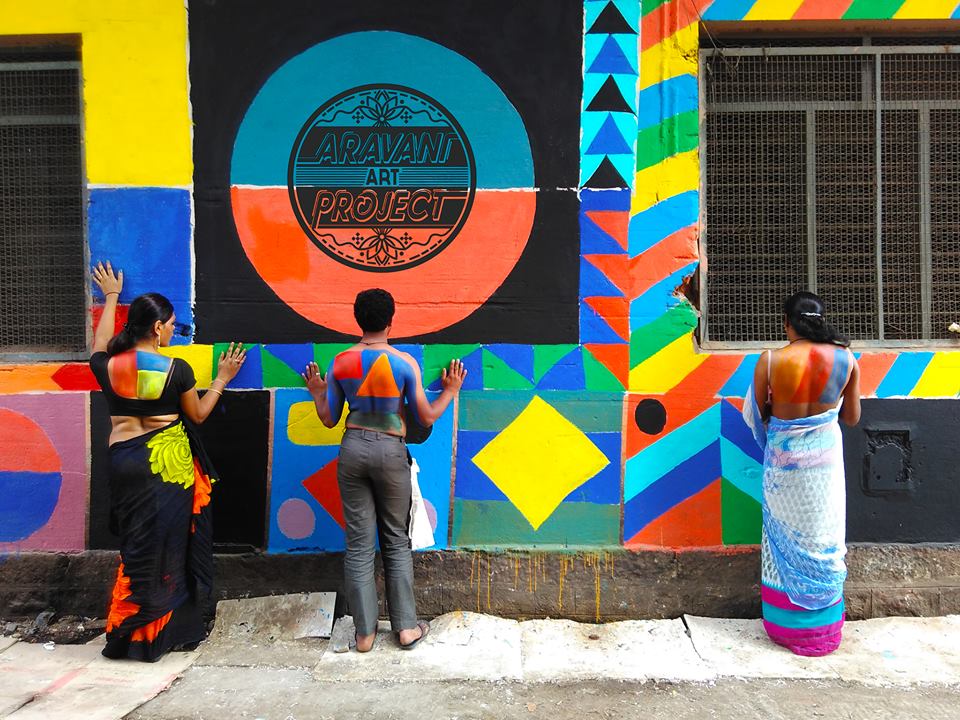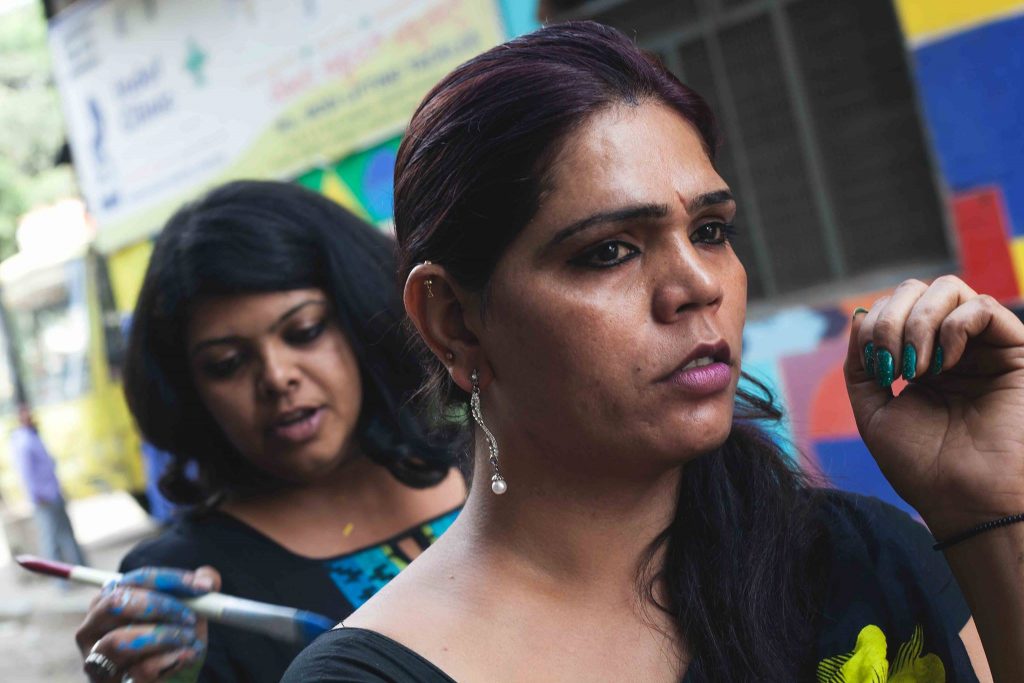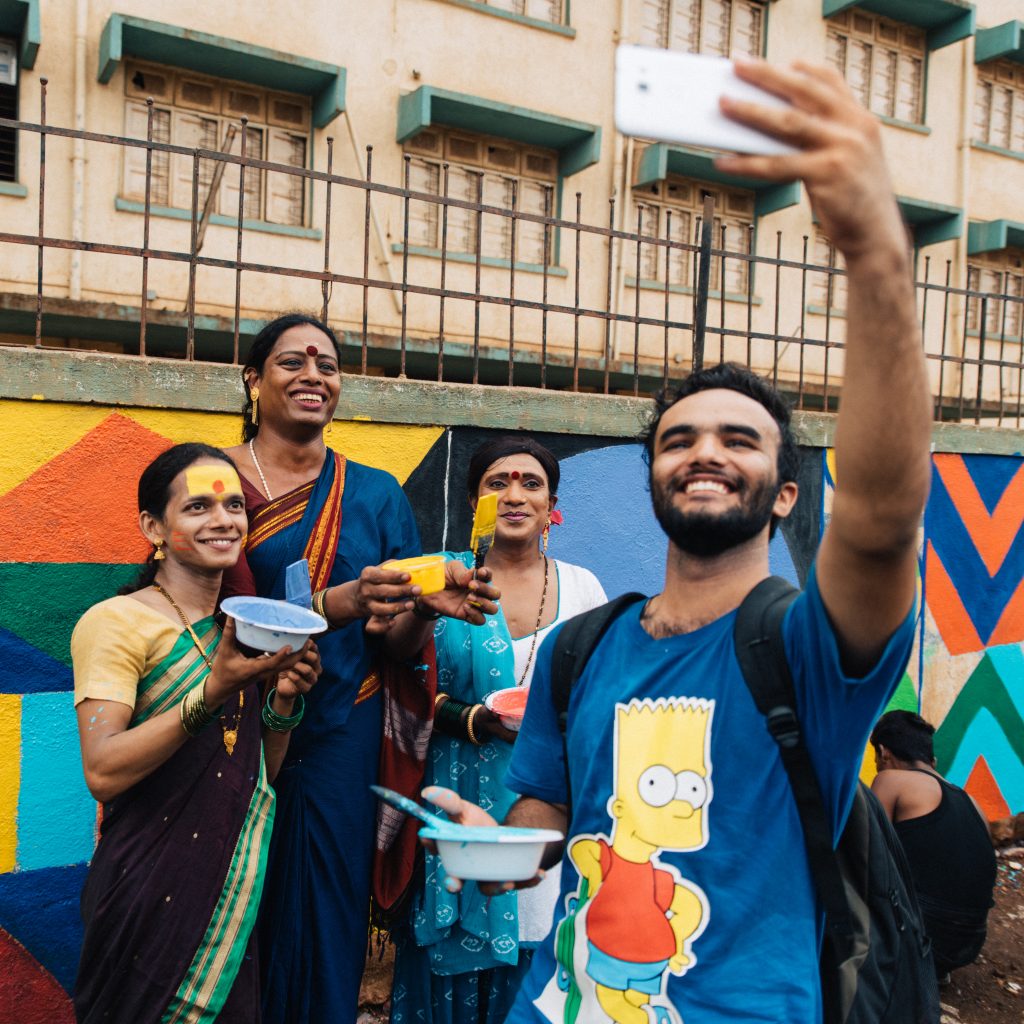When freelance artist, Poornima Sukumar signed up to help a documentary filmmaker, Tabitha Breese, to put together a feature on the transgender community, she had no idea that it would change her life. Having forged lifelong friendships within the community, she found herself wanting to give them a platform and space to demonstrate their unique identity – and help them break down the stagnant stereotypes that have long been associated with them.
Thus, the Aravani Art Project was born. Poornima says,
After a series of discussions with near and dear friends, the practicality of involving the transgender community, who otherwise are begging or into sex-work, became clear. The main aim was to introduce them as human beings with no strings attached.
What Is Aravani?
Few people realise the religious and cultural etymology of the word ‘Aravani’. Poornima is happy to explain, “Aravani, derived from Tamil Nadu, India, is a name chosen to remove the innuendo of the word ‘Hijra’. Picking a non stigmatised name like that was the intention. The meaning of the term ‘Aravani’ literally means a person who worships Lord Aravan.”
Delving deeper into the significance of the name, we learnt about the Aravani festival hosted yearly by the town of Koovagam in Tamil Nadu. The festivities celebrate the sacrifice of Arjuna’s son, Aravan, who gave up his life so that the Pandavas could win their war. As a reward, Lord Krishna took female form and married him – giving him joy for the short period that he lived. This celebration is a big event for the transgender community who participate. The day after the fun, they symbolically mourn their husband, Aravan, by wearing white and grieving his death.
Fascinated by these traditions, Poornima was moved to call her new project ‘Aravani’. She says,
Aravani Art Project’s objective is to organically create a space for the transgender community in a society where we can enable conversations, mainly through visual arts – art as an expression, art as recreation, and the idea that art is available and viable to all. No change or empowerment is possible if you do not involve the community and make them part of the process. Thus, the idea is to involve Aravanis in the process of creativity and equip them with the artistic tools required to express their stories of freedom, their dreams of acceptance, and their hopes of being on par with the society they live in.
Finding Solace In Art
An unconventional artist herself, Poornima understands the necessity for a creative outlet. She explains, “The meaning of art has changed for me at various times in my life. I never thought that I would be an artist when I was younger, it was only a dream. So, when a dream materialises, there is nothing more beautiful than facing challenges to keep it alive. The thought that art should be available to all is deeply rooted in me, and art is not necessarily only on a canvas or a painting or in galleries.”
Having decided, at a young age, that she was going to follow her heart, she found herself gravitating towards helping people and using her passion for art as an aid, “It was an important point in my life when I decided to just live on my own terms. I realised that my heart lies in the streets and in doing social work. The best way to tackle this was through art. There are different kinds of people expressing how they have enjoyed every minute of painting a wall, and how therapeutic it has been for them. The one thing that most of the time I hear from the transgenders is that they are treated like human beings – they feel respected and not just sympathised with.”
Striking The Right Note – Respect Not Sympathy
Sukumar is quick to point out that no one likes to be pitied and that everyone craves and deserves basic respect. She says,
It is a community with very beautiful people who have been shunned in the society, just because according to ‘us’ they don’t fit in. They have a very difficult time fighting battles constantly, first with themselves, then with their families, then with society. Some of them have had extremely difficult lives. However, this is the only information that all of us get to know, through the media or documentaries. The result has only been sympathy and that does not help anyone.
Sounds harsh? It’s a reality check that many require to understand that the transgender community wants to integrate not set themselves apart. “As ‘common people’, we tend to distance the things that we don’t understand. Yes, there have been several discussions of being treated badly when the trans-persons come begging, etc – but we have to understand that they behave like that because of years of discrimination. If we, as educated people, continue to do so, this is going to be a never-ending circle of absolute ridiculous lack of empathy. We will never be able to understand the hurdles they go through because, in a way, we have become their hurdles.”
Inclusivity starts at home, and it has to start with our children. She says,
It’s also very important to instill liberal thinking among children. You do not tell them to be afraid of a transgender person at a traffic signal or point at them or laugh at them in front of your children. All you need to do is be a little open hearted and talk to them…like you would to me!
Thinking Bigger, Becoming Better
What are Aravani’s future plans? Poornima has a few ideas up her sleeve. She elaborates, “We have experimented with having a talk given by transgender activists and transgender friends who are willing to share stories. The response has been really good. Another experiment was putting up a chai stall at a lovely flea market space called Kitsch Mandi. All my Transgender friends want to learn English.” She continues,
My future plans definitely involve helping them find some employment. I wish we could get someone to invest in a restaurant or cafe completely run by transgenders or rescued sex workers. It’s a big beautiful dream.
What have the reactions been to her work? Has she faced any discrimination or hatred for choosing to work with the community? Thankfully, she has plenty of positivity to share, “My parents have been so supportive and have become much more informed and sensitive about the transgenders. I am constantly receiving support from different people who are reading and sharing articles, having discussions and questions.”
Poornima’s work has given the transgender community and ‘common’ folk like us common ground to open a dialogue that has been a long time coming. Change is coming, and though a gender-fluid world is still a dream, people like Poornima – artists, dreamers, and activists – are doing their bit to pave the way. As Joss Whedon says, “Equality is not a concept. It’s not something we should be striving for. It’s a necessity. Equality is like gravity. We need it to stand on this earth.”
If there’s any story that needs to be told, we will tell it. Write to us at contact@knowyourstar.com with your story lead, or contact us on Facebook or Twitter.


